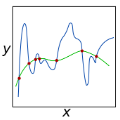Test-time adaptation (TTA) is the problem of updating a pre-trained source model at inference time given test input(s) from a different target domain. Most existing TTA approaches assume the setting in which the target domain is stationary, i.e., all the test inputs come from a single target domain. However, in many practical settings, the test input distribution might exhibit a lifelong/continual shift over time. Moreover, existing TTA approaches also lack the ability to provide reliable uncertainty estimates, which is crucial when distribution shifts occur between the source and target domain. To address these issues, we present PETAL (Probabilistic lifElong Test-time Adaptation with seLf-training prior), which solves lifelong TTA using a probabilistic approach, and naturally results in (1) a student-teacher framework, where the teacher model is an exponential moving average of the student model, and (2) regularizing the model updates at inference time using the source model as a regularizer. To prevent model drift in the lifelong/continual TTA setting, we also propose a data-driven parameter restoration technique which contributes to reducing the error accumulation and maintaining the knowledge of recent domains by restoring only the irrelevant parameters. In terms of predictive error rate as well as uncertainty based metrics such as Brier score and negative log-likelihood, our method achieves better results than the current state-of-the-art for online lifelong test-time adaptation across various benchmarks, such as CIFAR-10C, CIFAR-100C, ImageNetC, and ImageNet3DCC datasets. The source code for our approach is accessible at https://github.com/dhanajitb/petal.
翻译:测试时间适应的概率生涯框架
测试时间适应(TTA)是指在推理时间给定来自不同目标域的测试输入时更新预先训练的源模型的问题。大多数现有的TTA方法假定目标域是静态的,即所有的测试输入来自单个目标域。然而,在许多实际设置中,测试输入分布可能会随时间而生涯/连续漂移。此外,现有的TTA方法也缺乏可靠的不确定性估计,这在源域和目标域之间发生分布移位时至关重要。为了解决这些问题,我们提出了PETAL(带有自我训练先验的概率生涯测试时间适应),使用概率方法解决了生涯TTA问题,并自然地导致(1)一种学生-教师框架,其中教师模型是学生模型的指数移动平均值,以及(2)使用源模型作为正则化器在推理时间对模型更新进行正则化。为了防止生涯/连续TTA设置中的模型漂移,我们还提出了一种基于数据驱动的参数恢复技术,它有助于通过仅恢复不相关参数来减少误差积累并维护最近域的知识。在预测错误率以及基于不确定性的指标(如Brier分数和负对数似然)方面,我们的方法在各种基准测试中都比在线生涯测试时间适应的最新技术取得了更好的结果,例如CIFAR-10C、CIFAR-100C、ImageNetC和ImageNet3DCC数据集。我们的方法的源代码可在https://github.com/dhanajitb/petal上获得。



